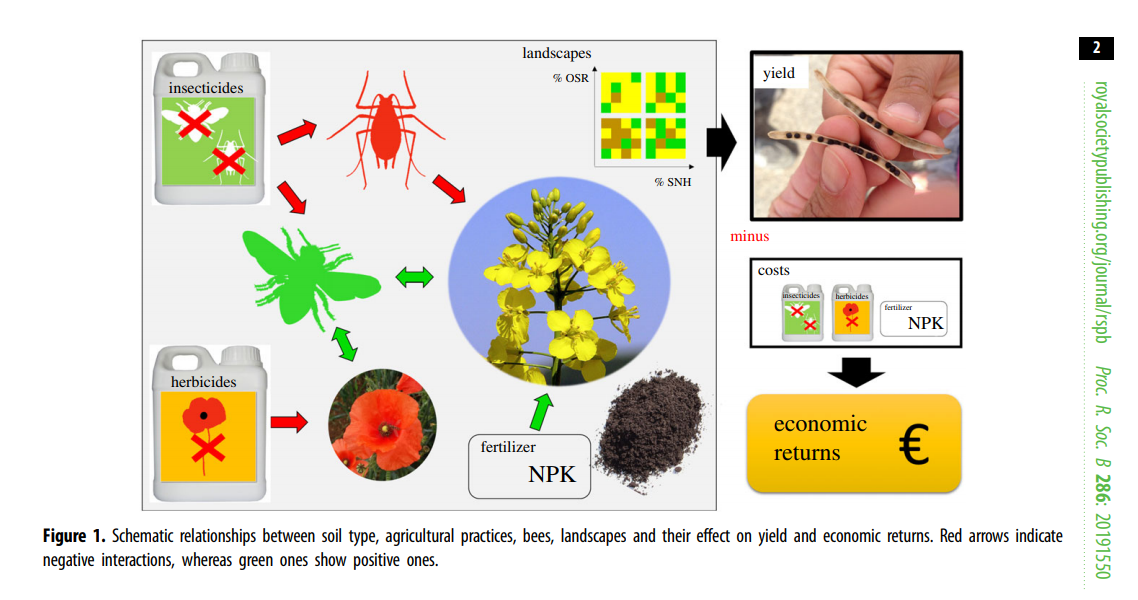23
Oct
Bees Enrich Farmers More than Synthetic Inputs, According to Study
 (Beyond Pesticides, October 23, 2019) Bees provide benefits to farmers that outweigh synthetic inputs, according to a large-scale field study published in Proceedings of the Royal Society B earlier this month. Addressing the ongoing question of how much natural ecosystem services are worth, scientists analyzed the costs and benefits of biodiversity versus agrichemicals. Researchers found the value pollinators add to oilseed rape (OSR) production by increasing yields is higher than synthetic chemical inputs, which are costly to farmers and decrease beneficial insect abundance. The title of the study touts the impressive findings, “Bee pollination outperforms pesticides for oilseed crop production and profitability.”
(Beyond Pesticides, October 23, 2019) Bees provide benefits to farmers that outweigh synthetic inputs, according to a large-scale field study published in Proceedings of the Royal Society B earlier this month. Addressing the ongoing question of how much natural ecosystem services are worth, scientists analyzed the costs and benefits of biodiversity versus agrichemicals. Researchers found the value pollinators add to oilseed rape (OSR) production by increasing yields is higher than synthetic chemical inputs, which are costly to farmers and decrease beneficial insect abundance. The title of the study touts the impressive findings, “Bee pollination outperforms pesticides for oilseed crop production and profitability.”
Researchers collected data over six years from 294 OSR fields in France with various levels of soil quality, fertilizer and pesticide applications, and pollinator abundance. They measured pollinator biodiversity with nets and traps at the field sites. Farmers offered data on yield, costs, and profits. Using linear models fitted to the large data set, the study analyzed combined effects of inputs on OSR yield and gross margin. Bee abundance was the only variable that had a positive effect on gross margins.
Pollination is an ecosystem service that benefits one out of three agricultural crops. Studies from Ireland show that insect pollination can increase OSR yield up to 35%, with a value of 2.6 million Euros per year in the whole nation. However, there are few studies that have attempted to analyze the net benefits of pollinators versus chemical inputs in agriculture. The researchers state, “Based on a very large dataset spanning 4 and 6 years, this study provides a comprehensive analysis of the synergy and antagonism between agrochemical applications and biodiversity, and their effects on yield and income.”
The region in France where the study was conducted is rich in pollinators, with over 250 native bees. In fields that hosted plenty of these bumbling workers, gross margins were an average of 15% higher than fields with lower pollinator diversity and could increase margins up to 40%. The use of insecticides is related to decreased bee abundance and is harmful to pollinators, but the research noted that productivity lost due to the use of pesticides could be offset with additional synthetic nitrogen. The benefit of using synthetic inputs to increase productivity, however, did not compensate for the cost of the chemicals. Interestingly, while the use of insecticides did reduce the number of agricultural pests, this study found no relationship between decreased pests and effect on yield.
This study offers fodder for the agroecology movement that touts the value of natural systems over synthetic inputs. As the study says, “Based on a large scale field survey, our results therefore support a ‘win-win-win’ balance between crop production, farm income and the environment.” The scientists encourage future studies in various farming areas as the bioregion in France is not necessarily ubiquitous.
As insect populations plummet worldwide, it is more important than ever to recognize the incredible wealth that biodiversity adds to our environment and, perhaps more tangibly, dinner plates. What more, various studies have now shown that toxic pesticides do not increase productivity or add economic benefit to farmers. Organic agriculture, which avoids the use of toxic chemicals, is a booming industry that supports farmers, pollinators, and consumers alike.
To help move the nation and world to organic and regenerative approaches that benefit producers, consumers, and the environment, follow Beyond Pesticides’ coverage of organics; engage with its Action of the Week; check out its Tools for Change; and consider joining the organization as one more way to advocate for the transition away from chemical agriculture. A better, less toxic world is possible.
All unattributed positions and opinions in this piece are those of Beyond Pesticides.










